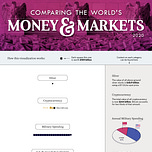Everyone wants a recession
Hindsight bias is always 20/20. Many people who lived through 2008 always say they should have bought more houses/a house during that time because they would be rich. The people that are saying this are definitely not wrong – they would have been rich if they did. Sadly, they didn’t. It’s very easy to point out the past and say exactly what one should have done, but very few understand what makes it possible to even do so.
The hardest part is that people want a recession to happen, but when it happens they never act. This is because most people either don’t have a plan or aren’t well versed in risk management to pull the trigger. When maximum pain and fear are in the market, people have a hard time overriding their emotional impulses. Much of this is attributed to recency bias, and temporarily exaggerates the amount of damage being done in a certain period of time.
What made 2008 the best era for obtaining wealth?
The housing market was unregulated. It was very easy to qualify for a home loan because there wasn’t any checks and balances to prove someone was financially stable to make the payments. Other people who were flipping homes were able to “cash out refinance” (pulling equity from a home without selling it) and snow ball their gains into more projects. As supply started to come off the market, house prices started to increase, and temporarily increased the demand. This started to have a negative domino effect when the fun stopped, and many people were liquidated or caught holding the bag when things started to go south.
Some of these people had subprime/adjustable rate mortgages (variable interest loans) because they offered the cheapest amount of interest and allowed the buyer to afford the payments. As the interest rates started to increase, the payments started to increase, and when people started to default on the payments – supply started to come back onto the market. However, what if everyone in the United States defaulted all at once? That’s exactly what happened – a massive supply shock that put all of the homes on fire sale. No buyers. Just empty homes.
What is happening with cryptocurrency?
You may be wondering where I’m going with this, but if you’ve caught on – congrats! Yes. Cryptocurrency is going to be regulated in the next one to two years and continue to be regulated for decades. This is where the fun starts because people are about to miss the point completely. It’s very easy to look at the crypto market and think Ponzi schemes are everywhere, but they exist in all asset classes. One of the questions you may need to ask yourself is why would something need to be regulated, if at all, if there’s no potential or if it’s a scam. Why would the government go to such lengths to do so? Of course we cannot answer this question for you, but it’s something to think about. As a result there’s a lot of studying one needs to do if they’re unaware of what’s going to happen next.
Why we think there’s going to be massive capitulation?
One word: Leverage.
We mentioned that we would talk about our thesis for a 13.5k Bitcoin price in one our market updates: read that here
Institutions have more sophisticated tools and money, but they have the same counter-party risk as anyone else. We believe there will be a liquidity crunch because many people are leveraged too much. This is not just in the United States – this is a worldwide problem.
From some of the headlines above, you can already see some of these events have played out. Unfortunately, majority of the people that left their crypto on exchanges became the secured creditors for some of these firms. If you are lending Bitcoin out when it is an unregulated asset class – things can definitely go wrong. This is no different than the 2008 lending problem, but when times are good people tend to get greedy.
Many people were getting a yield on their cryptocurrency this cycle, but some took this too far on the institutional side. This is not something new in the finance industry – in fact, many of these crypto exchanges were executing something called “fractional reserve Bitcoin.” Fractional reserve is when a bank/institution loans out a significant amount of BTC/money that is deposited to their bank/institution to make money. It looks something like this:
This is the start of the problem, but it won’t be the last. Many people will be wiped out when all of this blows over. These are just some of the companies that are trying to make it through, but other institutions are starting to get sweaty palms due to margin calls.
Marketcap comparison
The picture below is outdated since it was in 2020, but that hasn’t stopped assets from growing. The amount of resources will decrease as the global population increases, which is why asset classes are important to hold over the long term.
If we take Bitcoin right now, not cryptocurrency, then we can see that it is less than 1 trillion dollars in market cap. To increase the value of an asset by double, the same amount of money has to be invested in the asset. Bitcoin is trading around 19k levels, at the time of writing (7/2/2022), and is around a 400 billion dollar market cap. At 800 Billion it trades at 40k.
To give you a comparison of Bitcoin to other asset classes:
Derivatives – 500 Trillion – 1 Quadrillion Market Cap
Real Estate – 250 Trillion Market Cap
Stocks – 115 Trillion Market Cap
Gold – 10 Trillion Market Cap
Bitcoin – 400 Billion Market Cap.
What do you think is easier to move?
Is crypto the lottery ticket?
Maybe. This industry has the most potential growth.
The masses may not take advantage of this period of time that will be coming up, but we hope that everyone can see through the smoke and mirrors and execute their plan flawlessly. Everyone thinks they are late to the party, but the party has only just begun. As the liquidity crunch destroys the market cap for Bitcoin/Crypto, many people will be too fearful to get in at these cheap levels. Once we achieve adoption - money will flow into this space and increase the marketcap exponentially.
Just remember that crypto is one area that is globally new to everyone. Many people don’t even understand the industry, but what will happen when they understand it? We can look at multiple areas of technology and see the same human behavior – cell phones, planes, cars, mobile apps, computers, etc. It’s a prime time to understand a technology when the masses do not understand it because it gives you an investors edge by knowing the industry and the value it holds.

















Share this post